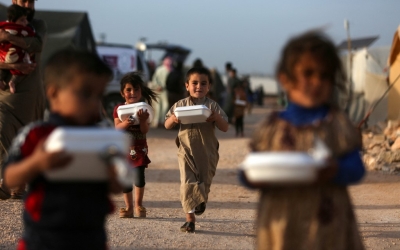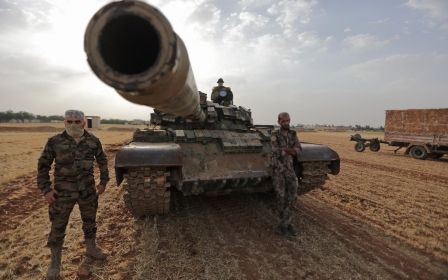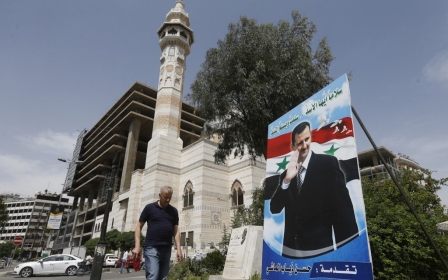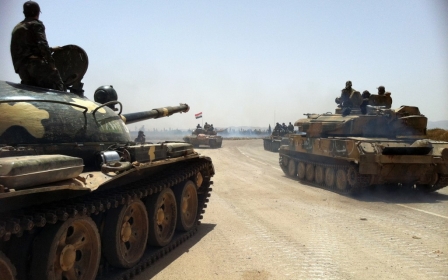Why the West needs a radical rethink on Syria

The Syrian conflict is frozen. After more than a decade of fighting, outright victory for any side looks unlikely. Given the deep involvement of several regional and international powers, any shift in dynamics is now dependent on outsiders instead of Syrians.
But external efforts to mediate have been fruitless for years. The UN-led Geneva process never got off the ground, while the initially more successful Russian-led Astana process has also now ground to a halt. The Syrian economy remains paralysed, with 90 percent of Syrians in poverty, lacking access to power, investment and trade. A new approach is clearly needed.
A recent report by the Dutch Clingendael think tank offers one such radical vision to unlock the peace process. The authors, Malik al-Abdeh and Lars Hauch, argue that western policymakers need to reconceptualise the conflict.
Rather than continue their forlorn efforts to broker the optimistic “Syrian-led political transition” proposed by the UN in 2015, they should accept that this is an impossible goal for now. Instead, they should focus on more modest, achievable outcomes: improving the lives of ordinary Syrians, inhibiting warlordism, and preventing Syria’s permanent partition.
'Practical connectivity'
New MEE newsletter: Jerusalem Dispatch
Sign up to get the latest insights and analysis on Israel-Palestine, alongside Turkey Unpacked and other MEE newsletters
To do this, they propose western actors move beyond their current focus on sanctions, accountability and humanitarian aid, and towards restoring “practical connectivity” between Syria’s three areas of control: the Turkish-backed opposition-held northwest, the US-backed Kurdish-dominated east, and the rest of the country held by President Bashar al-Assad with support from Russia and Iran.
With very little interaction among these areas, warlords emerged to control smuggling routes, squeezing their already weak economies, and accelerating the drift towards permanent partition.
The Clingendael report urges western governments to encourage controlled trade, flows of goods and people, investment, and educational cooperation among the regions. This will help restore regional ties, boost their economies, and reduce suffering. After some years of successful re-engagement, more long-term questions can then be addressed.
The authors argue that this need not mean abandoning broader goals of holding the Assad regime to account for its crimes and working towards a just transition of power. But they recognise that pursuing this currently unrealistic goal has subordinated the needs of ordinary Syrians and is making matters worse.
Such pragmatism is much needed and there is a lot to praise in the report. It acknowledges that, whatever their lofty goals, western policy is not working and needs to evolve beyond the narrow focus of punishing Assad if it is to prevent Syria from becoming a failed, partitioned state on Europe’s doorstep.
Potential problems
A potential problem with the report’s proposal, however, is that it would allow sanction-busting through the back door. An important part of Al-Abdeh and Hauch’s recommendations is that trade, mostly Turkish goods, can flow from the Turkish-backed northern regions into Assad’s Syria.
This new approach would require the kind of foresight and practicality from western actors that has been wholly lacking in their engagement with Syria
This would benefit the struggling Turkish economy as it would open new markets, not just in Syria but beyond it in Jordan and the Gulf. This might not officially violate western sanctions that forbid dealing with the regime, as Turkey could sell the goods to its northern Syrian allies who would then sell them on to Assad, but this would be the flimsiest of legitimising veneers.
Yet perhaps this kind of face-saving mechanism is how western policy can escape its current bind. It can insist that it is maintaining sanctions and holding President Assad at arm’s length until he meets their conditions, while still helping struggling Syrians.
In the meantime, such a move would economically benefit not just Ankara and its northern Syrian allies, but the beleaguered city of Aleppo which is strategically placed to become the "port" for goods coming in from Turkey. The shattered eastern cities of Raqqa and Deir-Ezzor could have similar roles for improved trade between regime territory and the Kurdish-dominated east.
This new approach, however, would require the kind of foresight and practicality from western actors that have been wholly lacking in their engagement with Syria. Such is the regime’s penetration of the Syrian economy that Assad and his allies Iran and Russia would almost certainly be financially rewarded by any improvement in Syria’s economy, and that might be too much for western actors to bear, especially given current tensions with the latter over Ukraine.
Competing interests
Preventing the Syrian president from benefiting in any way, even if it has a detrimental impact on the Syrian people, has been the western priority for some time, and it seems unlikely to change now. Similarly, despite the Clingendael report noting that this opening up would benefit all the external players in the long term, Russia, Iran and Turkey are unlikely to entertain it.
Each gains enough from the status quo in Syria and is under little pressure to make such a radical change.
Though the authors may lament it, it is unclear whether Tehran, Ankara or Moscow actually have any problem with the effective partition of Syria as long as their interests are met by it. Russia and Turkey, for example, have historically been happy to support breakaway republics in Georgia, Ukraine and Cyprus.
Again, as with the West, the report is asking them to show concern for the long-term wellbeing of Syrian people that they have not shown in the conflict so far and seem unlikely to discover now. As a result, it seems unlikely this report will pave the way for the radical rethink that the Syria conflict badly needs.
This is not the first such commendable innovative peace proposal, but we have not yet seen domestic or international leaders willing to prioritise the needs of the Syrian people over their own to bother considering them.
The views expressed in this article belong to the author and do not necessarily reflect the editorial policy of Middle East Eye.
Middle East Eye delivers independent and unrivalled coverage and analysis of the Middle East, North Africa and beyond. To learn more about republishing this content and the associated fees, please fill out this form. More about MEE can be found here.






